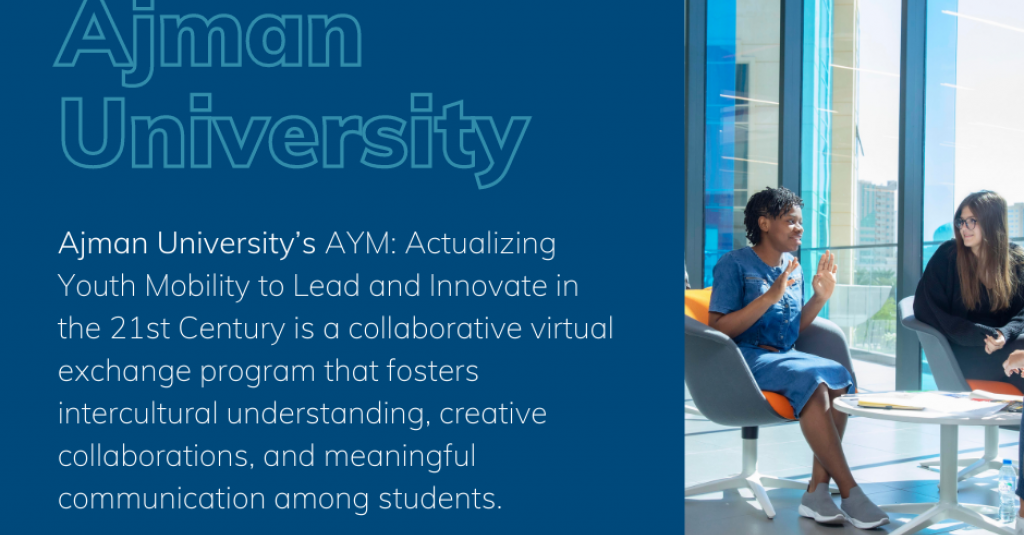Ajman University’s Participation in Stevens Initiative Provides Global Exposure and Intercultural Appreciation to Students

Ajman University (AU) is one of the few grantees of Stevens Initiative, a cross-border initiative between US universities and their global counterparts to foster meaningful cultural interactions among young students. Tizreena Ismail, Lecturer at AU’s College of Humanities and Sciences is the Coordinator of Actualizing Youth Mobility to Lead and Innovate in the 21st Century (AYM), Ajman University’s participating project funded by the Stevens Initiative. Tizreena spoke to Content Strategist Tabrez Khan, about her experience of the program and the many benefits it confers on participating students and faculty in terms of global exposure, intercultural understanding, and making sense of ideas and concepts in an international context.


Actualizing Youth Mobility to Lead and Innovate in the 21st Century is supported by the Stevens Initiative, which is sponsored by the U.S. Department of State, with funding provided by the U.S. Government, and is administered by the Aspen Institute. The Stevens Initiative is also supported by the Bezos Family Foundation and the governments of Morocco and the United Arab Emirates.
“It’s an innovative program that connects faculties and students in the MENA region allowing them to exchange, explore and collaborate through interactive classrooms and engaging activities. I signed up to be a part of Stevens Initiative Connected Classrooms initially as the idea of connecting with like-minded faculty interested me, and the opportunity to utilize virtual teaching and learning across borders was exciting,” says Tizreena, with a hint of excitement under her measured tones, a clear indicator of her profound interest in the project.
After an incredible semester of co-teaching an English Communications course with her faculty partner from Portland State University in the USA, Tizreena came to love the transfer of experiences, teaching and learning practices, and the bonds of friendship that she was able to form through the COIL course. “This was very much in line with my own teaching philosophy and an enrichening experience. The Stevens Initiative seed grant presented an opportunity for me to continue such virtual exchange initiatives long term, allowing me an opportunity to embed all that I believe in regarding the creation of dialogic classroom and learnings from my first COIL virtual exchange,” adds Tizreena.
“My role as a Coordinator of the AYM program allowed me to be a part of this excellent project right from conception,” she adds.
How does the program work
The AYM Program’s exclusivity is in its easy integration into a variety of existing undergraduate courses across different fields of study. The program is initiated through the pairing of two faculty partners, one from AU and another from a partner institution in the US. Faculty are then required to undergo training that allows them to get to know their faculty partners and informs them about the themed tasks of the AYM program that they would need to integrate into the course syllabuses. Faculty then co-teach eight classes throughout the semester with their faculty partners in the US.
During the virtual classes, students from AU and students from the USA are required to collaborate on tasks, engage in group discussions, explore and investigate real world problems and exchange their ideas in a culturally rich, communicative environment.
Based on models of dialogism, critical thinking and the pursuit of curiosity in everyday courses, the themed tasks in the AYM project can be applied in a flexible manner into any existing course syllabus without changing the nature of the course itself. This unique aspect of the AYM program allows easy integration of the program into a variety of courses in universities.
“As a coordinator of the AYM program, I designed the framework of the program including the mapping of the initiative’s curriculum through dialogic activities students would be involved in during their virtual exchange. I also explored and established partnerships with Universities in the US, specifically Portland State University and cooperated on various aspects of the AYM proposal to secure the Stevens Initiative grant. My role also includes the organization and involvement in workshops and ensuring the sustainability of the program beyond the seed grant,” says Tizreena.
Benefits of Stevens Initiative
Ajman University’s AYM program as part of the Stevens Initiative offers AU students an opportunity to interact and share their experiences with students in the US. . Additionally, the AYM program also equips students with the skills necessary to apply their creative ideas and relate them to their own, as well as international contexts, which will better prepare them for future encounters.
The benefits of the AYM program also extend to the faculty involved in this program, allowing them to connect with scholars across the globe, thereby aiding the internationalization of the University. By building such connections faculty can benefit from transfer of teaching experiences and philosophies, involve themselves in cross border research and explore future collaboration possibilities.
Finally, the AYM program encapsulates the ever-progressive vision and mission of AU’s “Make it Happen Initiative”. Through the implementation of intercultural dialogic, virtual learning, the AYM program fits directly into the goals of AU, namely in providing cutting-edge education, impactful research, and community engagement.
“As a faculty I am always interested in making my classes interesting and fun, whilst at the same time meaningful for my students. The collaborative nature of the AYM program which encourages student exploration and collaboration on a variety of learning topics related to real world as well as everyday contexts, is in tandem with my own learner-centered, dialogic teaching philosophy. I believe that learning should not be limited for students. Instead, as faculty we should inspire long term knowledge and skills within our students, enabling them to navigate the increasingly complex global society they will become citizens of successfully,” concludes Tizreena.